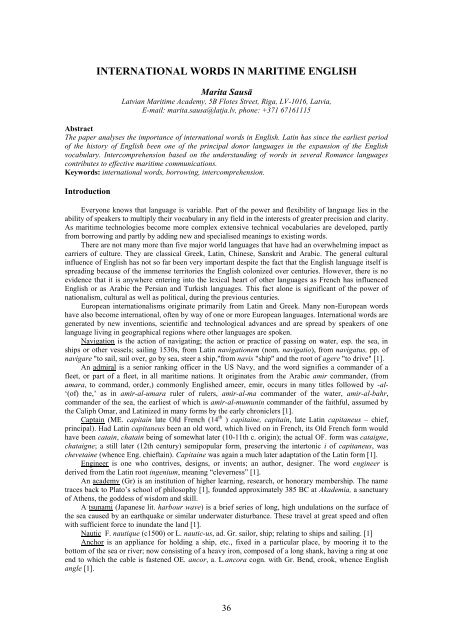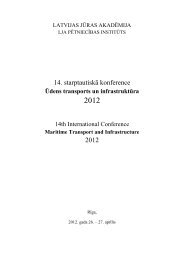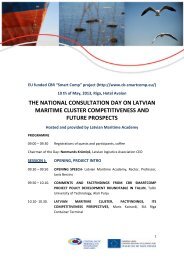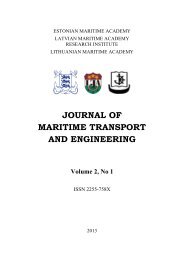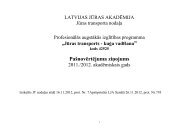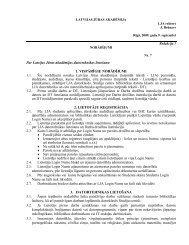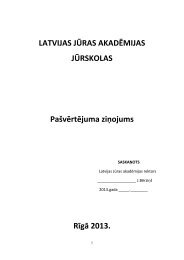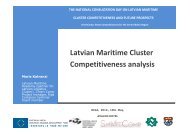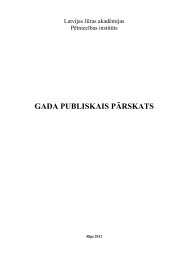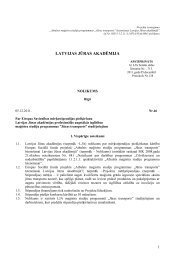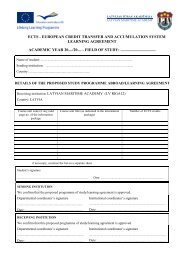Latvian Maritime academy
Latvian Maritime academy
Latvian Maritime academy
You also want an ePaper? Increase the reach of your titles
YUMPU automatically turns print PDFs into web optimized ePapers that Google loves.
INTERNATIONAL WORDS IN MARITIME ENGLISH<br />
Marita Sausā<br />
<strong>Latvian</strong> <strong>Maritime</strong> Academy, 5B Flotes Street, Riga, LV-1016, Latvia,<br />
E-mail: marita.sausa@latja.lv, phone: +371 67161115<br />
Abstract<br />
The paper analyses the importance of international words in English. Latin has since the earliest period<br />
of the history of English been one of the principal donor languages in the expansion of the English<br />
vocabulary. Intercomprehension based on the understanding of words in several Romance languages<br />
contributes to effective maritime communications.<br />
Keywords: international words, borrowing, intercomprehension.<br />
Introduction<br />
Everyone knows that language is variable. Part of the power and flexibility of language lies in the<br />
ability of speakers to multiply their vocabulary in any field in the interests of greater precision and clarity.<br />
As maritime technologies become more complex extensive technical vocabularies are developed, partly<br />
from borrowing and partly by adding new and specialised meanings to existing words.<br />
There are not many more than five major world languages that have had an overwhelming impact as<br />
carriers of culture. They are classical Greek, Latin, Chinese, Sanskrit and Arabic. The general cultural<br />
influence of English has not so far been very important despite the fact that the English language itself is<br />
spreading because of the immense territories the English colonized over centuries. However, there is no<br />
evidence that it is anywhere entering into the lexical heart of other languages as French has influenced<br />
English or as Arabic the Persian and Turkish languages. This fact alone is significant of the power of<br />
nationalism, cultural as well as political, during the previous centuries.<br />
European internationalisms originate primarily from Latin and Greek. Many non-European words<br />
have also become international, often by way of one or more European languages. International words are<br />
generated by new inventions, scientific and technological advances and are spread by speakers of one<br />
language living in geographical regions where other languages are spoken.<br />
Navigation is the action of navigating; the action or practice of passing on water, esp. the sea, in<br />
ships or other vessels; sailing 1530s, from Latin navigationem (nom. navigatio), from navigatus, pp. of<br />
navigare "to sail, sail over, go by sea, steer a ship,"from navis "ship" and the root of agere "to drive" [1].<br />
An admiral is a senior ranking officer in the US Navy, and the word signifies a commander of a<br />
fleet, or part of a fleet, in all maritime nations. It originates from the Arabic amir commander, (from<br />
amara, to command, order,) commonly Englished ameer, emir, occurs in many titles followed by -al-<br />
‘(of) the,’ as in amir-al-umara ruler of rulers, amir-al-ma commander of the water, amir-al-bahr,<br />
commander of the sea, the earliest of which is amir-al-mumunin commander of the faithful, assumed by<br />
the Caliph Omar, and Latinized in many forms by the early chroniclers [1].<br />
Captain (ME. capitain<br />
th ) capitaine, capitain, late Latin capitaneus – chief,<br />
principal). Had Latin capitaneus been an old word, which lived on in French, its Old French form would<br />
have been catain, chatain being of somewhat later (1011th c. origin); the actual OF. form was cataigne,<br />
chataigne; a still later (12th century) semipopular form, preserving the intertonic i of capitaneus, was<br />
chevetaine (whence Eng. chieftain). Capitaine was again a much later adaptation of the Latin form [1].<br />
Engineer is one who contrives, designs, or invents; an author, designer. The word engineer is<br />
derived from the Latin root ingenium, meaning “cleverness” [1].<br />
An <strong>academy</strong> (Gr) is an institution of higher learning, research, or honorary membership. The name<br />
traces back to Plato’s school of philosophy [1], founded approximately 385 BC at Akademia, a sanctuary<br />
of Athens, the goddess of wisdom and skill.<br />
A tsunami (Japanese lit. harbour wave) is a brief series of long, high undulations on the surface of<br />
the sea caused by an earthquake or similar underwater disturbance. These travel at great speed and often<br />
with sufficient force to inundate the land [1].<br />
Nautic F. nautique (c1500) or L. nautic-us, ad. Gr. sailor, ship; relating to ships and sailing. [1]<br />
Anchor is an appliance for holding a ship, etc., fixed in a particular place, by mooring it to the<br />
bottom of the sea or river; now consisting of a heavy iron, composed of a long shank, having a ring at one<br />
end to which the cable is fastened OE. ancor, a. L.ancora cogn. with Gr. Bend, crook, whence English<br />
angle [1].<br />
36


